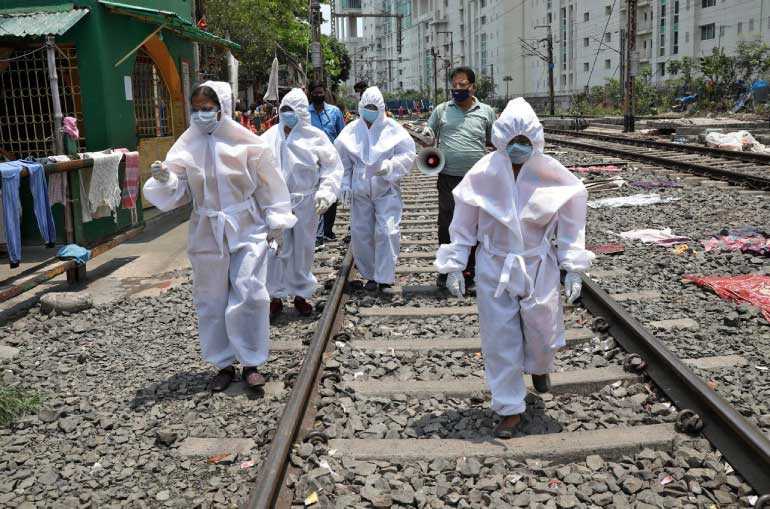Saturday Feb 21, 2026
Saturday Feb 21, 2026
Monday, 27 April 2020 00:00 - - {{hitsCtrl.values.hits}}

Health workers wearing protective gear walk on a railway track as they arrive in a slum area for a door-to-door verification of people to find out if they have developed any of the coronavirus disease (COVID-19) symptoms, in Kolkata, India – REUTERS
NEW DELHI (Reuters): India allowed shops in residential areas to reopen from Saturday, more than a month after the country went into lockdown to curb the spread of the coronavirus, federal and state officials said.
The federal home ministry said late on Friday that retailers could resume operations with the staff numbers reduced by half as long as employees wore masks and gloves and appropriate social distancing was maintained.
The sale of liquor and other non-essential items continues to be banned and no shops in large market places or multi-brand and single-brand malls will be allowed to reopen until 3 May.
Members of industry groups welcomed the partial resumption of activity but said a large number of businesses faced bottlenecks due to a lack of raw materials and police restrictions on the movement of workers.
India has reported 24,942 cases of COVID-19, the disease caused by the coronavirus, and 779 deaths. The authorities have set up teams to focus on compliance with lockdown measures.
In a letter to Prime Minister Narendra Modi, the president of the main opposition Congress party, Sonia Gandhi, said small businesses faced economic ruin and job losses due to the absence of any major support from the government.
She called for a fiscal package of at least one trillion rupees ($13 billion) to protect wages of employees in small businesses and to provide credit guarantees on bank loans.
“Every single day of the lockdown comes at a cost of 30,000 crore ($3.9 billion) to the sector,” she said. In Modi’s home state of Gujarat, authorities allowed software and IT companies to start operations on Saturday with up to 50% of their staff though some industry bodies urged members to start with only 10% to 15% of the workforce.
“It is crucial to avoid a rush of employees to offices to prevent spread of coronavirus,” said Maulik Bhansali, chairman of Gujarat Electronics and Software Industries Association.
Authorities in the eastern state of Odhisha allowed stranded labourers to travel within the state for work.
‘Smart lockdown’
In Pakistan, the government extended a nationwide lockdown until 9 May. However, it is switching to a “smart lockdown” from Saturday with targeted tracking and tracing of cases while allowing some industrial and commercial activities to resume under safety guidelines.
“Isolating these cases and their contacts will improve our ability to contain the disease alongside allowing the economy to function and people to get employment,” said planning minister Asad Umar, who oversees Pakistan’s coronavirus response body.
“This upcoming month of Ramadan will be decisive,” he said, emphasising that adhering to the government’s virus containment measures would allow other parts of the economy to restart.
Prayer congregations for Ramadan have also been allowed in Pakistan with the exception of the southern province of Sindh, where doctors have warned the virus could spread rapidly.
In Karachi, the capital of Sindh and Pakistan’s largest city, most mosques were closed for Ramadan evening prayer gatherings, which began on Friday.
Bangladesh extended its nationwide lockdown to 5 May and ordered mosques to restrict attendance at Ramadan evening prayers to 12 people.